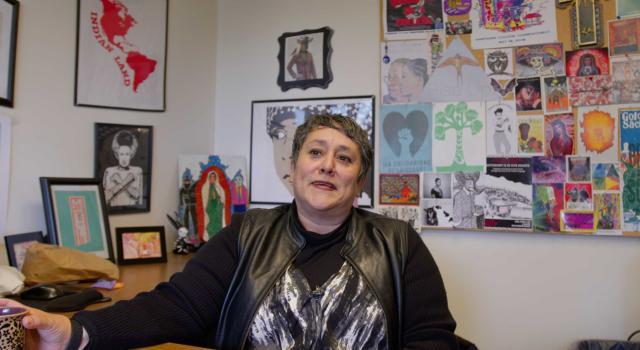
Susana Loza

Susana Loza received her B.A. degrees in political science and psychology from Stanford University and a Ph.D. in comparative ethnic studies from the University of California at Berkeley.
She teaches cultural studies, critical race theory, film and media studies, popular music, feminist theory, and ethnic studies. Her research interests include the social construction of race and sex in speculative media; power, privilege, and cultural appropriation; gender and ethnic performativity in digital spaces; the politics of sampling and remixing; the colonial dimensions of gaming; the activist potential of social media; and the post-racial turn in popular culture.
Professor Loza’s publications include “Haunted by Settler Nostalgia: (Lat)Indigenous Specters, White Vampires, and the Historical Amnesia of Twilight,” “Postracial Amnesia: Doctor Who in the Brexit Era,” “Steampunk Style and the After-Life of Empire,” “Hashtag Feminism, #SolidarityIsForWhiteWomen, and the Other #FemFuture,” “Playing Alien in Post-Racial Times,” “Samples of the Past: Performative Nostalgia, Illicit Sounds, and Cultural Transformation in Latin House Music,” “Sampling (Hetero)sexuality: Diva-ness and Discipline in Electronic Dance Music,” “Vampires, Queers, and Other Monsters: Against the Homonormativity of True Blood,” and “Orientalism and Film Noir: Subjective Sins and Othered Desires.”
Professor Loza’s previous book, Speculative Imperialisms: Monstrosity and Masquerade in Postracial Times (Lexington Books, 2017), explored the resurgence of ethnic simulation in science fiction, horror, and fantasy in a putatively post-colonial era. Her current project, Settler Gothic, excavates the colonial ideologies and gothic elements of contemporary U.S. horror television and film.
Recent and Upcoming Courses
-
This course examines the fraught intersection of politics and popular culture in the US. In this class, we ask: What is pop culture? How does it differ from other cultural expressions? How does pop culture both challenge and reify white supremacist capitalist patriarchy? What and who get to be political? How does pop culture act as a vehicle for the appropriation or exploitation of Other cultures? Is consuming pop culture a form of political action? How do explicit political themes both enrich and detract from consumption? What economic imperatives drive pop culture production? What are the relationships between commerce, politics, and art? Particular attention will be paid to: the racialized construction of masculinity and femininity in popular culture; the appropriation of racial and gender identities; the role of global capitalism in the production of popular culture. This course is reading-, writing-, and theory-intensive. keywords:Media Studies, Ethnic Studies, Critical Race Theory, Gender Studies, American Studies
-
Since its founding, the US has closely regulated the bodies of Others and punished those that rebel against these socially-constructed designations. Utilizing an interdisciplinary amalgam of Critical Race Theory, Sexuality Studies, Queer Theory, Media Studies, Sociology, American Studies, Performance Studies, and Feminist Theory, this course will explore how the state, the media, and civilian institutions police the boundaries of race, gender, and sexuality by pathologizing, criminalizing, and stigmatizing difference. We will also examine how the subjects burdened with these dangerous inscriptions evade and contest them through passing, performativity, and other forms of identity-based resistance. Special attention will be paid to the criminalization of cross-racial and same sex desire; the re-biologization of racial and sexual difference; the dehumanization of immigrants; the racialization of crime; the gendering of mental disorder; the war of neurodivergence; the biopolitics of reproduction; eugenic surveillance; and the role of The Law in constructing and controlling deviant bodies. Keywords:Critical Race Theory, Disability Studies, Queer Studies, Legal Studies, Sociology
-
This course explores race, queerness, and the politics of play within the games industry and games community. By critically investigating racial stereotypes, gendered constructs, and ableist assumptions within the varied field of gaming (digital, table-top, LARPing), we can begin to understand and analyze how race, gender, and normativity structure our desires and code our cultures. This course will employ Game Studies, Cultural Studies, Queer Studies, Critical Race Theory, and Disability Studies. Questions to be considered include: What role does capitalism play in the production of games? Do games reinforce racist, ableist, and misogynist stereotypes? Can games be used to ethically explore difference? How do BIPOC/queer/disabled game designers reimagine tired tropes and create new realms for us to inhabit? What do games reveal about the complex relationships between marginalized bodies, history, and technology? How can we harness the power of gaming to disrupt and dismantle white supremacy, settler colonialism, and cisheteropatriarchy? Keywords:Game Studies, Popular Culture, Disability Studies, Critical Race Theory, Queer Studies
-
This course examines questions of race, gender/sexuality, and disability in science fiction, horror, and fantasy film and television. It investigates how and why people in different social positions have been constructed as foreign, freakish, or monstrous. In addition to exploring the relationship between sex/gender norms and hierarchies based on race/species or class/caste, we will also consider the following questions: Does the figure of the alien/freak/monster reconfigure the relationship between bodies, technology, and the division of labor? How do such figures simultaneously buttress and transgress the boundary between human and non-human, normal and abnormal, Self and Other? How does society use the grotesque body of the alien/freak/monster to police the liminal limits of sexuality, gender, and ethnicity? How does The Other come to embody Pure Evil? Finally, what are the consequences of living as an alien/freak/monster for specific groups and individuals? Keywords:Ethnic Studies, Critical Race Theory, Gender Studies, Film and Media Studies, Disability Studies
-
Although early internet theorists imagined the World Wide Web as a wild frontier where only minds mattered, social media testifies to the lasting force of bodily inscriptions like race, gender, sexuality, dis/ability, and class. In this course, we will consider how identity shapes how we communicate, debate, collaborate, and mobilize online. We will investigate how different populations engage with digital technologies and social media in particular; how such environments expedite stereotypes and construct difference; and how online platforms like YouTube, Twitter/X, Instagram, and Facebook are tools of social justice as well as replicators of reactionary ideologies. Our critical arsenal will draw upon Media Studies, Gender & Sexuality Studies, Cultural Studies, and Ethnic Studies. We will apply these theories to current events online. Throughout our examination of the politics of hashtags, memes, and trolls, we will foreground the ways that power relations continue to inform how bodies travel through the digital realm Keywords:Digital media, social media, social justice, Internet studies, sociology
-
Historically, settler states and imperial regimes have disenfranchised and dispossessed racialized Others by constructing ideological frameworks that justify and obscure the ongoing violence of the colonial process. Through a close examination of film, television, music, and digital media, this course will explore how contemporary US popular culture fabricates and disseminates imperialist fantasies and settler mythologies. It will interrogate the political meanings embedded in popular culture and ask: What do imperial productions and settler creations reveal about the tangled relationships between race, history, and desire? How do colonial and imperial settings propagate racism, sexism and ableism; anxieties about class, gender, and sexuality; and concerns about the white (settler) colonial state's ability to digest and domesticate non-normative Others? What are the material consequences of romanticizing imperialism and settler colonialism? Can cultural industries rooted in racial and sexual conquest be decolonized? How does one disrupt and subvert the white (settler) colonial gaze? Keywords:ethnic studies, critical race theory, colonialism, popular culture, film & media studies
-
Is music raced? Is it sexed? How do musical sounds and performances become racialized and sexualized? How does music reflect, reproduce, and/or contest gender and racial boundaries? How do individuals use music to express their cultural identity? Such questions hint at the undeniable yet ineffable influence of race and sex on the US musical imagination. This seminar will consider the fraught intersection of race, power, and desire in contemporary popular music (hip hop, electronic dance music, rock, pop, punk, R&B/soul, world music, etc.). Utilizing an interdisciplinary amalgam of Popular Music Studies, Post-Colonial Theory, Critical Race Studies, Ethnic Studies, Literary Criticism, Media Studies, Cultural Studies, and (Ethno)Musicology, we will investigate the local creation and global circulation of racially-coded and sexually-loaded sonic signifiers; questions of authenticity and appropriation; music as a form of cultural resistance and colonial domination; and music as a key component in identity formation. This course is reading-, writing-, and theory-intensive Keywords:Popular Music, Ethnic Studies, Queer Studies, Performance Studies, Black Studies
-
This seminar will examine the history of US immigration from the founding of the American nation to the great waves of European, Asian, and Mexican immigration during the 19th and early 20th centuries, to the more recent flows from Southeast Asia, Latin America, and Africa. In addition to investigating how these groups were defined and treated in relation to each other by the media, we will consider the following questions: Who is "American"? How does the American Dream obscure US settler colonialism and slavery? How do US immigration narratives, historically and currently, reveal the racial limits of citizenship? How do contemporary political debates about immigration compare with those from previous eras? Is public opinion about immigration shaped by the media? Special attention will be paid to the role of immigration in national politics; Hollywood's fabrication and circulation of ethnic and racial stereotypes; and the virulent xenophobia routinely exhibited in the media. This course is reading, writing, and theory intensive. Keywords:ethnic studies, critical race theory, american studies, media studies, sociology



